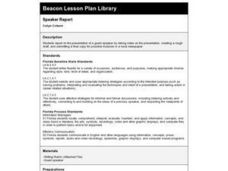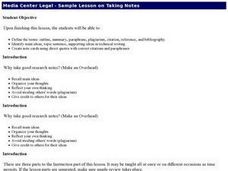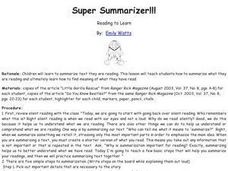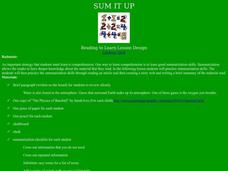Curated OER
Quoting, Citing, and Paraphrasing
Beware! (not only the Ides of March). Warn your researchers of the dangers of plagiarism! After defining the term, viewers are introduced to the consequences of and forms of plagiarism, as well as tips on how to avoid plagiarism....
Curated OER
Guest Speaker Preparation: A Cooperative Lesson
Are you planning to have a guest speaker talk to your class? Prepare in advance and help your class transform into an engaged and thoughtful audience. Before the visit, young writers work cooperatively to brainstorm what they want to...
Curated OER
"Sunday in the Park" Reader's Response
After reading Bel Kaufman's "Sunday in the Park," give your class the opportunity to react to the short story through writing. First they write a brief summary paragraph, and then they react to any events or characters' actions in a...
Curated OER
Speaker Report
Fifth through eighth graders think of themselves as newspaper reporters as they listen to a presentation by a guest speaker. As reporters, they take notes during the presentation. Using these notes, they create a rough draft and then a...
Curated OER
Summarization Superstars
How do you read when you know you're going to be summarizing a text? Summarize a nonfiction text with your upper elementary schoolers. Your pupils independently read a nonfiction article and write a summary paragraph using the six-step...
Curated OER
Teaching Summarization
Examine the process of summarizing a piece of text using the book So You Want to Be a President? Kids review the definitions for main idea, topic sentences, superordinate terms, and supporting details. Next, they work in small groups to...
Curated OER
Listening To a Guest Speaker
Pupils review the main points of note-taking to summarize the content of a formal or informal spoken presentation. They hear a guest speaker talk about a pre-arranged topic and take notes during the presentation. Next, they write a...
Curated OER
Shorten the Length
Learn how to summarize by identifying main ideas and supporting details. Readers cross out unimportant information as they read through a text. Is it a random detail? Cross it out! They then draw a concept map, placing the main idea in...
Curated OER
MLA Documentation Exercises
Has your school adopted the MLA style for documentation? If so, use this worksheet to assess whether or not your class members know the rules. Young researchers complete of series of documentation exercises using the MLA format. They...
Curated OER
Introduce: Summarizing Narrative Text
When scholars re-tell a story, do they boil it down to important details in a logical order? Practice summarizing narratives using this think-aloud strategy, which is scripted here for your convenience. After explaining why this is an...
Curated OER
Writing a Literary Analysis
What makes writing literary? What comprises analysis? A 15-slide PowerPoint presentation, created by the Purdue University Writing Lab, tackles these questions. The explanations of what makes writing literary and what comprises analysis...
Curated OER
Writing Session: Writing a Summary
The similarities and differences between academic and everyday summaries/abstracts are explored in this PowerPoint. After reading "Historiographic Reflection on Israel’s Origins: The Rise and Fall of the Patriarchal Age,” and abstracts...
Curated OER
Research and Documentation
Did you just assign a research project to your high school class? Begin the research process with this presentation. Give your class ideas about where to find information, how to evaluate sources, and how to properly cite them. The...
Curated OER
How Do I Write an Article Critique?
Your middle and high schoolers have written tons of summaries, but can they give a strong critique of an article they've read? Identify the differences between summary writing and critiquing. Choose an interesting article and have...
Curated OER
Modernism in Poetry, Painting, and Music
Are you teaching Modernism to your class? Connect different areas of artistic expression in the Modernist Era. Learners read T.S. Eliot, view art by Pablo Picasso, and listen to a Modernist musical composition. This final assignment is...
Curated OER
Sample Lesson on Taking Notes
Have your middle schoolers define the terms outline, summary, paraphrase, plagiarism, citation, reference, and bibliography. They identify the main ideas, topic sentence, supporting ideas in technical writing and create note cards using...
Curated OER
Retell And Summarize Text
Help your learners read a text and summarize it using their own words. The main idea and important details of an article are discussed before individuals write their summaries. To support discernment about what to include in a summary,...
Curated OER
Summarizing Key Information
Imagine the surprise when small groups present their Evidence Charts to the class and discover that each group has studied a different version of the Cinderella story. Irish, Ojibwa, Egyptian, Chinese, Korean, Persian, Mexican, and...
Curated OER
Plot the Oysters' Peril!
Use comic strips to teach sequencing in narrative poetry. As homework, each class member selects a comic strip with 4-8 frames, cuts the frames apart, places the pieces in an envelope, and brings the envelope to class. Class members swap...
Curated OER
Super Summarizer!!!
Emerging readers summarize a nonfiction text using a five step process. After a brief demonstration of the five-step method for summarizing text, they read a nonfiction article and write their own summary. A checklist of each summary is...
Curated OER
Sum It Up
After a review of the steps involved in writing a summary, class members read The Physics of Baseball by Sarah Ives and use a story web to identify the important details to include in their summary. Class members then choose an article...
Curated OER
Retelling Information
This scripted lesson suggests using the journalist’s five W’s (who, what, when, where, why) to teach readers how to summarize a story and to how to distinguish between significant and supporting details. A template and rubric are...
Curated OER
Summarizing with James and the Giant Peach
Elementary readers in literature groups practice summarizing chapter-by-chapter with Roald Dahl's James and the Giant Peach. Focus on main idea, supporting details, and the 5 Ws. Unfortunately, a clever "peach" graphic organizer to which...
Curated OER
Sense of Hearing
Create a graphic organizer to review parts and systems of the body, then present a new topic. Special education students grades 3-5 learn about the sense of hearing. They draw parts of the ear, sign a song, read Perk Up Your Ears, and...

























